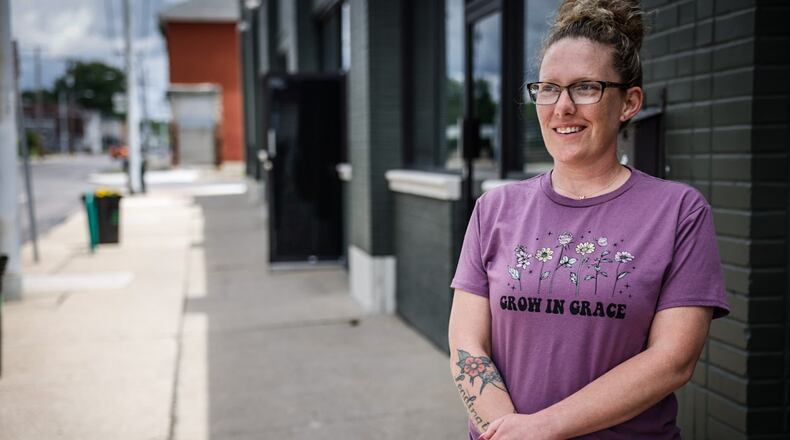“As soon as I let them know that I’ve been through what they’ve been through, they really do open up to me,” said Shepherd, 38, of Dayton.
Shepherd started with alcohol and marijuana when she was 12 years old, then used heroin and cocaine. A court order forced her into treatment, where she received her own help and hope.
“People loved on me until I was able to love myself,” she said.
Credit: Jim Noelker
Credit: Jim Noelker
She offers that same understanding and listening ear at two organizations in Dayton. Life Changing Family Care is a seven-month intensive outpatient program that provides housing and believes in restoring families, while at Sidewalk Soldiers she works at the Xenia Avenue drop-in center for women who have been sex-trafficked or are at risk of it.
Peer supporters like Shepherd have lived experience with either substance use disorder, or with mental illness. That personal experience makes those they work with more comfortable, she said.
“They can see there’s hope,” she said.
Maelin Strausbaugh, who nominated Shepherd as a Dayton Daily News Community Gem, is a case manager at Sidewalk Soldiers and counts Shepherd as both a coworker and a friend.
“She’s a role model to so many people in our community,” Strausbaugh said.
Shepherd is both compassionate and driven, helping others on a daily basis, said Strausbaugh, who particularly noted her colleague’s work with the homeless population. As soon as a woman walks through the door at Sidewalk Soldiers, she wants to know what that person needs and how she can help.
“It’s amazing to watch other people flourish through the steps that they took with her,” said Strausbaugh, of Twin Towers.
Shepherd said that she has been in the field for seven years, starting in 2017 with her work with the GROW team. Through the Get Recovery Options Working program, she rode with police and emergency medical services as the heroin epidemic raged. Responding to overdoses together, she was there to provide help and resources, or to simply sit and listen.
In 2019 she was named citizen of the year by the Miami Valley Crime Stoppers for her work in the community and responding to overdoses, she said.
Shepherd said that she wanted help even before she went into treatment, but she didn’t know where to go or whom to ask. Now she makes sure that she is open and available to others who need that information and support – even if it takes them years to get there.
The work takes patience, kindness and the knowledge that progress is made on “God’s timing,” she said. No matter how much she wants someone to receive treatment, that person has to want it, too.
“I didn’t know about treatment. I didn’t know about recovery,” Shepherd said. “That’s why I do what I do today.”
About the Author

